In Brno’s sensational coffee community, Jan Židů stands out for his grounded, hands-on approach. A former law student turned barista, café owner and even roaster! Jan has spent the past eight years building a coffee career that balances mobility with community and quality with warmth.
As the founder of coffee catering Dvakratdva and co-owner of Au Lait Espresso Bar, Jan blends travel, service, and craft into his daily routine. Whether he’s roasting or packing gear for an event, he stays focused on offering simple, thoughtful coffee – no fuss, no ego.
Jan’s story is less about chasing trends and more about making space for good conversations, better brews, and meaningful connections. His work reflects that philosophy, one well-extracted cup at a time!
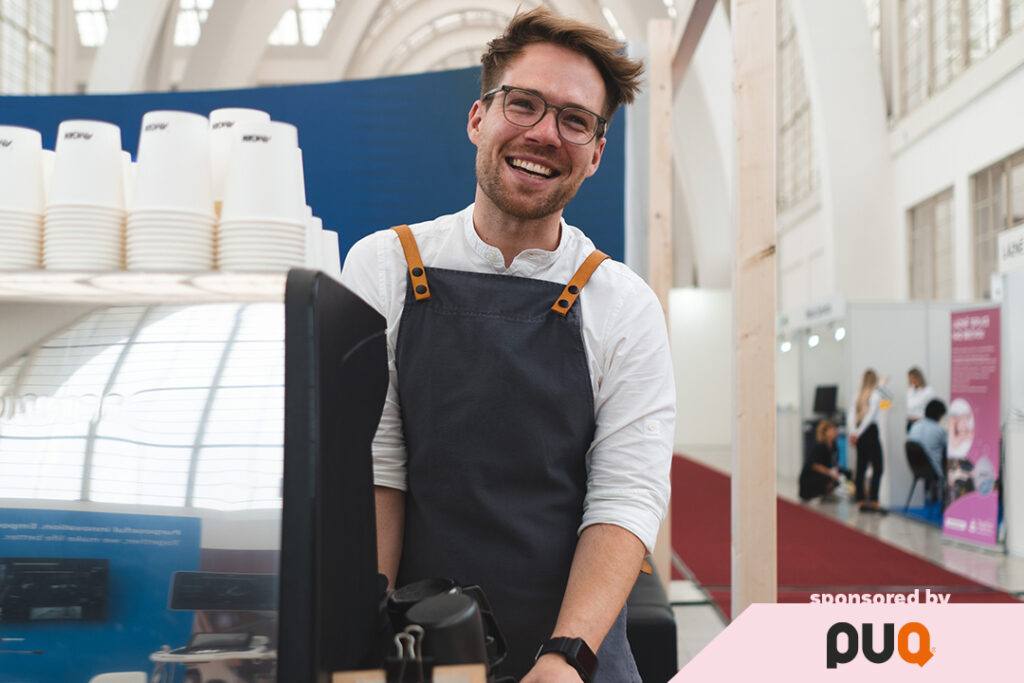
Jan, what is your first memory with coffee?
I don’t think it’s anything special or unusual—just my grandparents sipping their ´turek´ (steeped coffee) after lunch, pure 100% robusta. But my first real specialty coffee was a Kenyan espresso at my uncle’s place, made with a Sage coffee machine and a little bit of maple syrup.
You have quite a diverse background – how did you go from law to coffee? Was there a defining moment that made you leap?
There are quite a few similarities between the two – both involve working and talking with people. In coffee, though, you get to do the fun and pleasant parts. Most of the time.
But seriously—back in 2017, my mom used to buy roasted beans from one of the oldest roastery-and-café concepts in Brno called Caffé del Saggio. The café is styled like something from the Czechoslovak Republic, and she thought a gentleman like me would fit in perfectly. So she asked the owner if he was looking for a new, totally inexperienced barista. And he said yes. Little did my mother know that move would ruin my legal career for good.
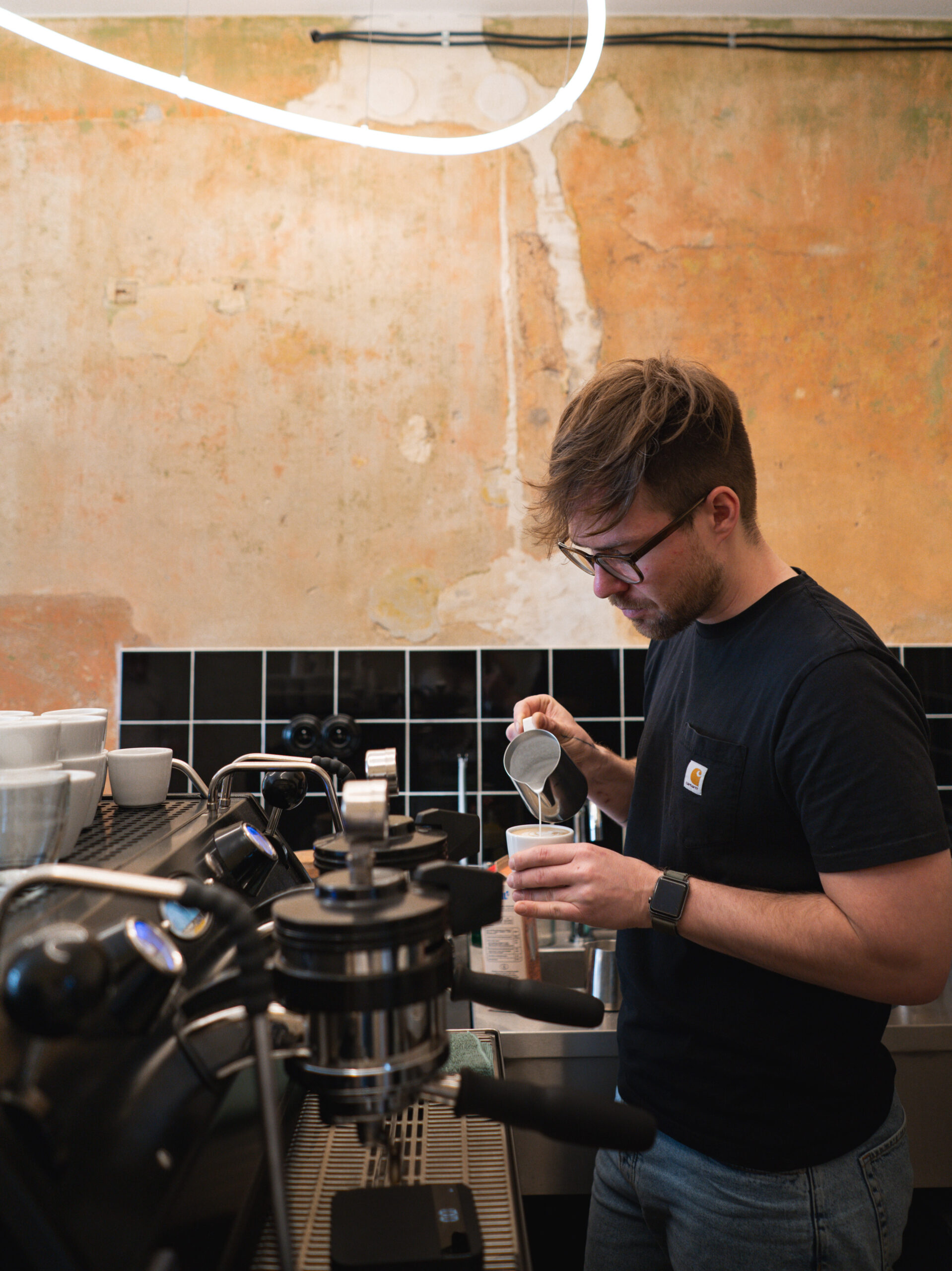
Tell us a bit about your coffee projects.
I’ve always loved travelling, and when I discovered coffee, it struck me as a great idea to combine the two – doing coffee catering means you travel and make coffee. Back then, we used beans from MOK Coffee Roastery in Belgium, which seemed irrational to some people, especially here in the Czech Republic, where we have dozens (maybe hundreds) of great roasteries. But I had a great relationship with MOK after using their coffee at a national barista competition, and their unique flavour profile helped us stand out from other coffee caterers.
Over time, we realised we wanted to have more control over the roasting process. So I bought a second-hand coffee roaster and slowly started to learn the craft. The next year, we began using our own beans at events. No one complained, so we made a full switch. That naturally led to opening our own small space where we could share our coffee with a wider audience.
What was your vision when you decided to open Au Lait?
Small and cosy places, fully focused on one product, were always a thing for me. My girlfriend Veru and I used to work at Monogram Espresso Bar, which is exactly that kind of place. We missed the feeling of one big shared table, a friendly atmosphere, and regulars who eventually become like family—all things that are hard to maintain when you’re constantly on the road doing catering.
In the meantime, we ran two five-month-long summer pop-ups called Tyjátr with our friends, where we served specialty coffee and natural wine. The first one was at Špilberk Castle—probably the most touristy spot in Brno – and the second was at UMPRUM, an artsy museum with a stunning terrace. At the end of the last Tyjátr, we were at a crossroads: do we wanna look for another pop-up place or open something more permanent? And that’s how the idea for Au Lait Espresso Bar was born.
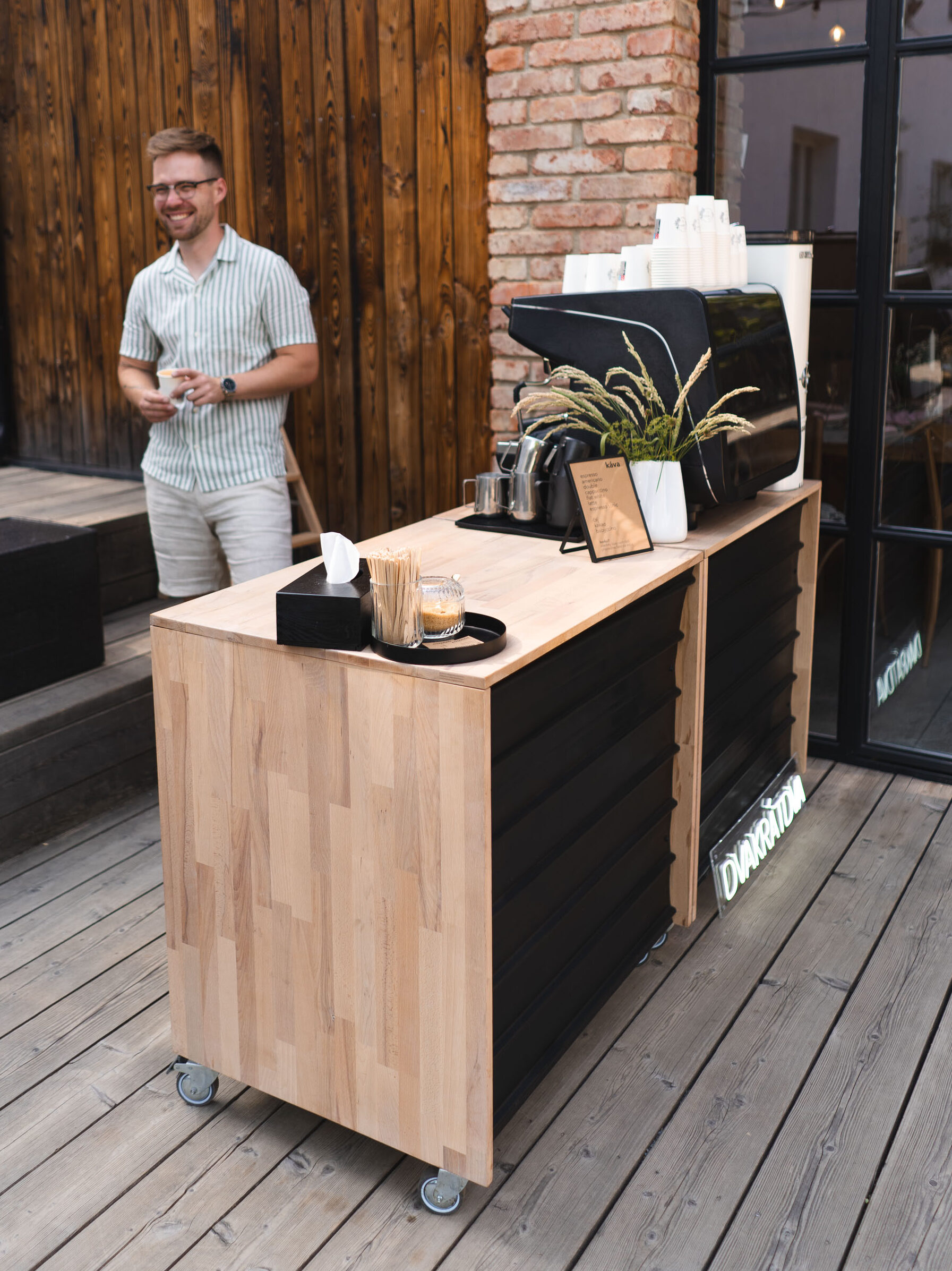
What kind of experience do you want your customers to have when they visit your place?
We want them to feel genuinely welcome, not overwhelmed with coffee-nerd information, but still able to enjoy a thoughtful and complete experience. We placed one big table in the centre of the café to create a community-oriented, family-like vibe, which fits perfectly with the neighbourhood where Au Lait is located.
Coffee catering is an interesting niche – what made you pursue it alongside opening a brick-and-mortar shop?
Coffee catering has been our main business – we’ve gained a lot of regular clients over the past four years. I also love the variety it brings. One day I’m roasting, the next I might be across the country serving coffee at an event. On other days, I’m packing coffee or standing behind the bar at Au Lait. No two days are the same, and that’s exactly what I need to avoid burnout.
What are some unexpected challenges in running a coffee catering business compared to a traditional café?
I’m not sure if they’re unexpected, but every venue and every client is different. In the end, it all comes down to your attitude and your approach to customers. After all, it’s a service. One thing I never really thought about before I started: 70% of catering is moving stuff and sitting in a car, 20% is laptop work, and only 10% is actually making coffee (hopefully that adds up to 100%—math has never been my strong suit).
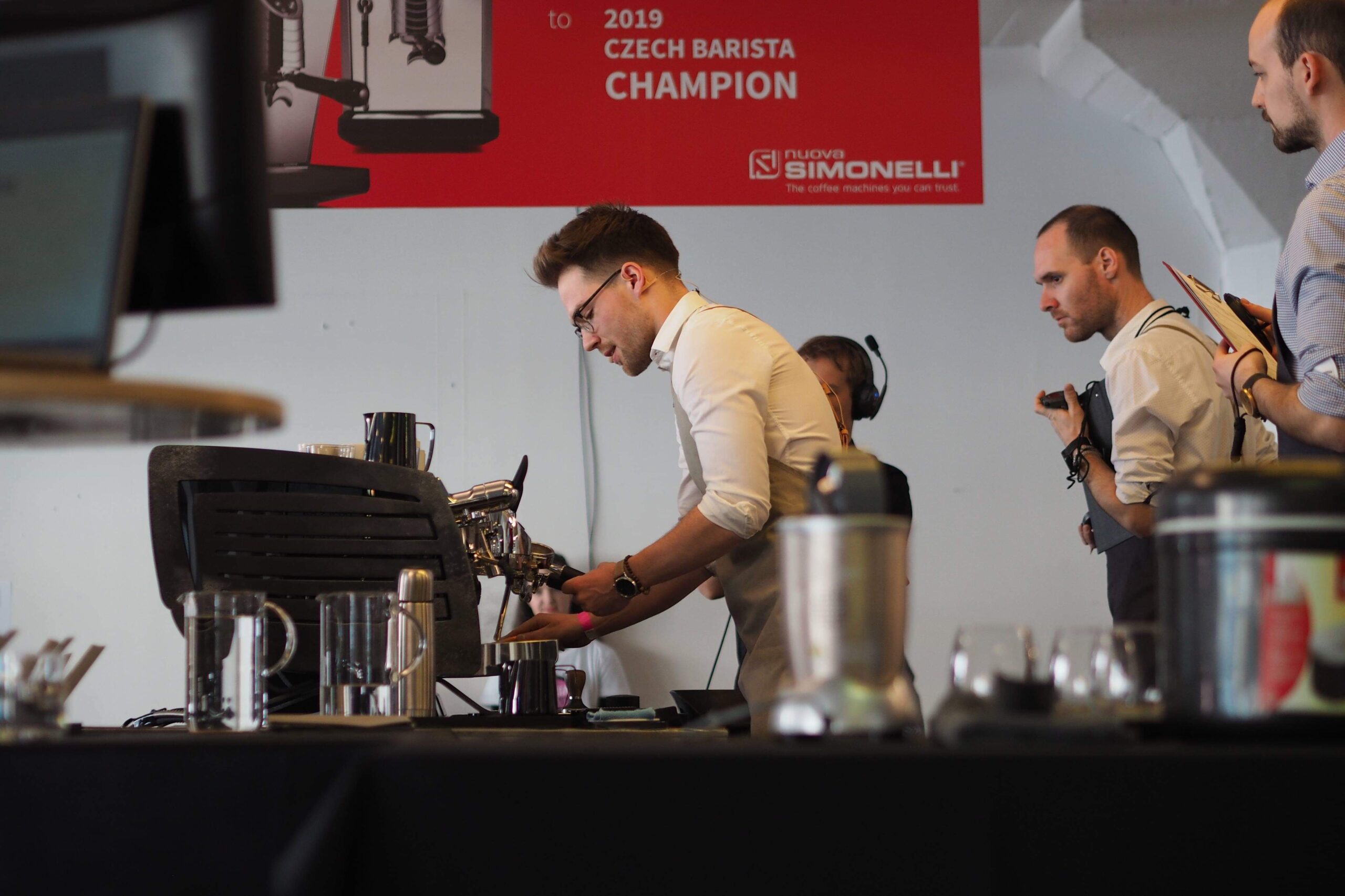
You opened next to a Natural Wine Shop – was that a strategic decision? Do you see a crossover between natural wine lovers and specialty coffee enthusiasts?
Our friends Tom and Lucie, who run the Natural Wine Shop, were also our partners in the Tyjátr pop-ups. Tom was looking for a bigger space and found one that was basically two rooms, each with its own entrance from the street and connected inside by a doorframe. From the beginning, we knew this was perfect for what we wanted to create. Tom and Lucie are also co-owners of Au Lait. It’s been six months since we opened, and I’d say we share a lot of the same customers. Some originally came for coffee and discovered natural wine, and some came the other way around.
How do you stay motivated and inspired to keep improving your coffee-making skills?
I definitely had a super-nerdy phase, but doing catering helped me see that it’s not just about chasing perfection—it’s about finding the balance between quality and great service.
Moving from being a barista to roasting, sourcing green coffee, and handling the entrepreneurial side keeps things from getting routine. There’s still so much to learn. And also, staying humble is really important to me.
If there were one piece of knowledge about coffee you’d like everyone to know, what would that be?
If it’s sour, it’s not the end.
What are your passions and hobbies apart from coffee?
This might sound like a cliché again, but I love travelling with my girlfriend and our two dogs in a van across Europe. Besides that, I’m a pretty clumsy repairman—I love taking things apart and trying to put them back together, especially coffee machines. Not always successfully.
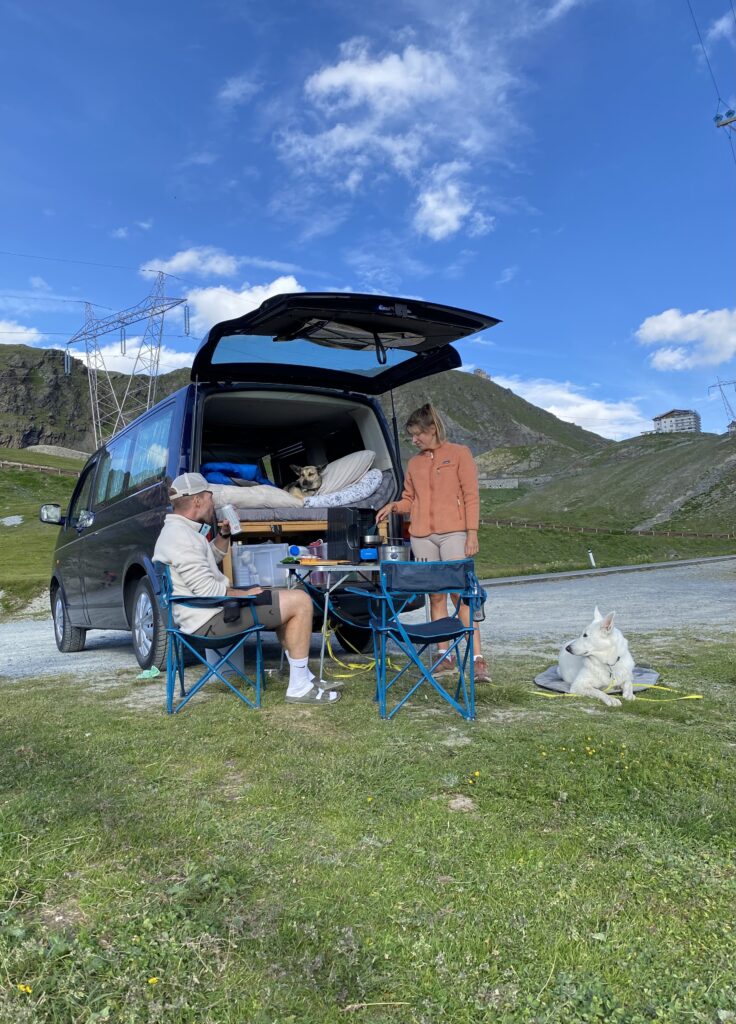
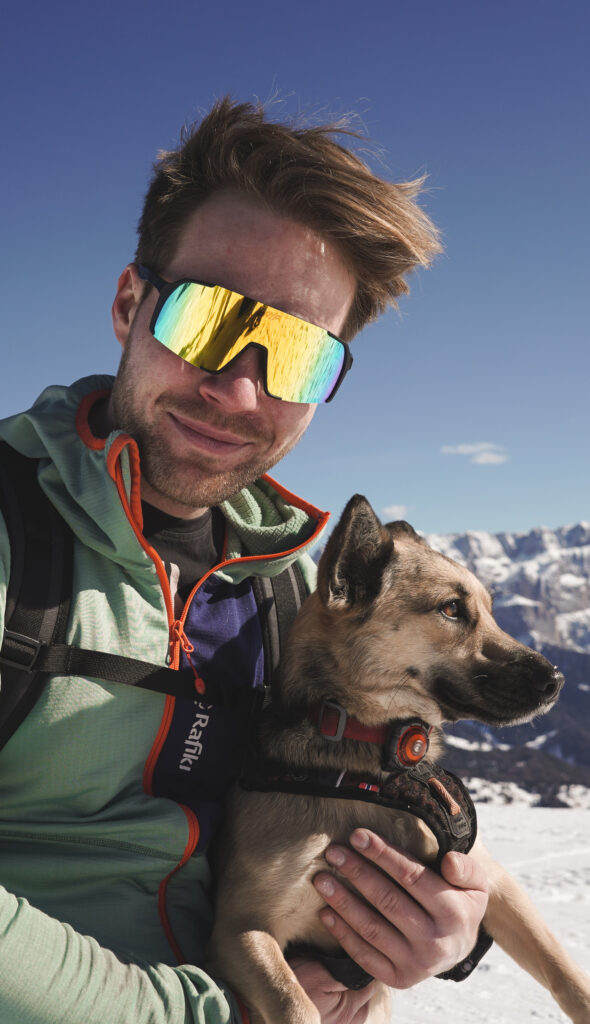
What kind of community do you hope to build around your cafe, and how do you plan to foster that sense of community?
The neighbourhood around Au Lait is very community-oriented. From day one, we wanted guests to feel like they were walking into a warm, homely space—somewhere they could meet old friends or make new ones. I hope we offer a welcoming and friendly vibe while still maintaining the quality of what we serve.
We heard you love long drives. If you could take a road trip to visit any coffee destination in the world, where would you go and why?
I’d love to explore Japan and their cosy cafés. Or visit a producing country like Colombia, Peru, or Ecuador—that would be amazing too.
What coffee challenges are you looking forward to? Any new projects or collaborations?
Every new green coffee we buy is a challenge. Last year, we moved into a bigger roastery because we needed more space for both production and catering equipment.
It’s a shared space with Adam Neubauer from Monogram, who also roasts coffee. I deeply respect Adam—not just for what he’s achieved in the coffee world, but because he’s simply a great human being. Sharing experience, knowledge, and just a little bit of gossip is something I absolutely love about our collaboration.
Every January, I tell myself that the upcoming year will be calmer and more focused on stabilising what we do, but it never turns out that way.

Quick Fire Questions for Jan Židů:
Filter coffee or espresso-based?
Cappuccino in the morning, filter for the rest of the day.
Milk coffee or black coffee?
It depends on what beans you are offering.
The most underrated coffee drink?
Lungo
The most underrated coffee brewer?
It is the Chemex, for a good reason!
Favourite piece of barista equipment?
Humbleness.
The number one place in Europe that every coffee geek should visit?
Tim Wendelboe’s Espresso Bar, Oslo.
Favourite city outside your own for a coffee tour?
Warsaw – it was love at first sight for me, but still trying to figure out why…

